Black History Month 2023 Reading List
Published February 01, 2023
Inside OME
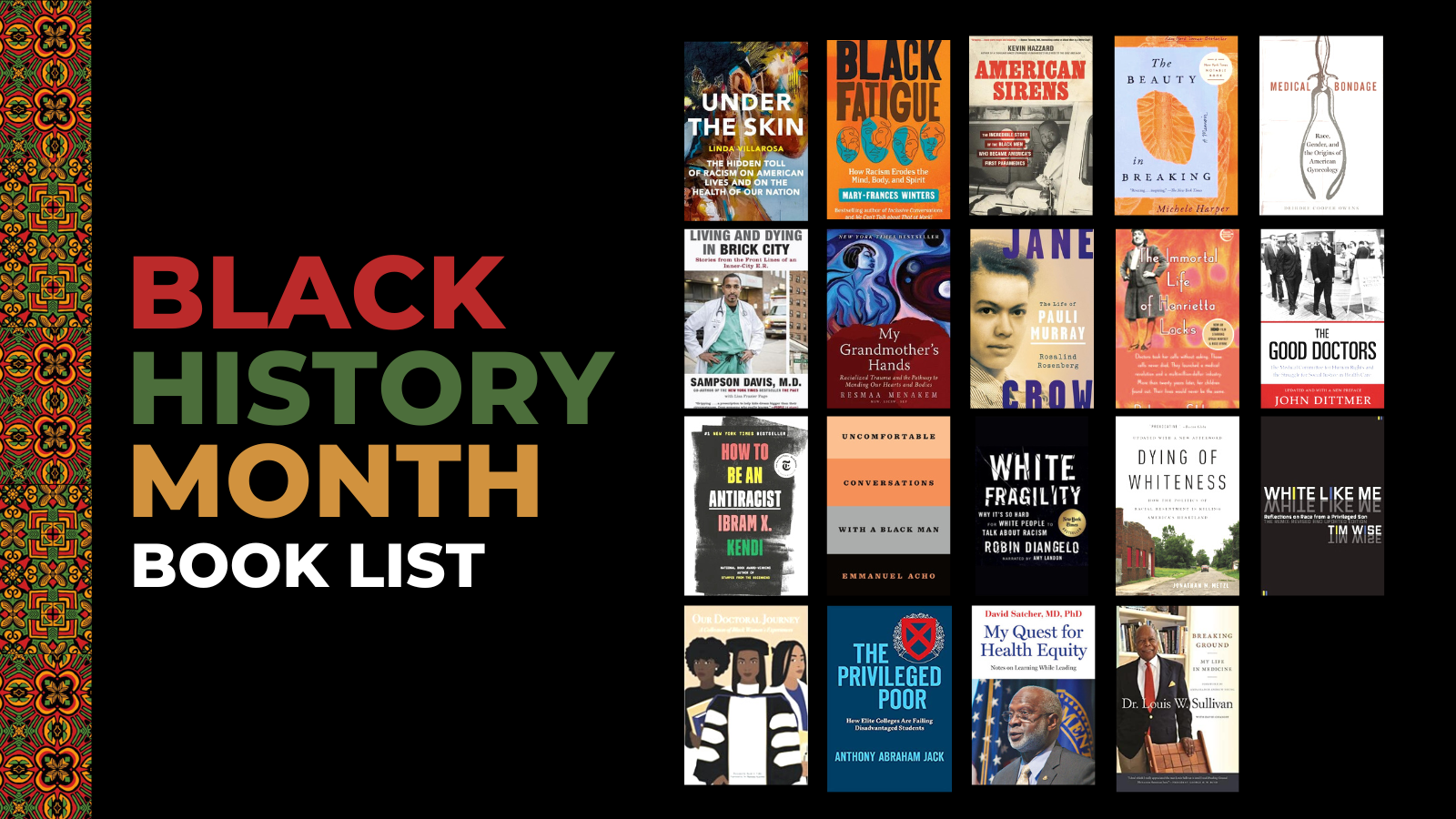
Health and Medicine
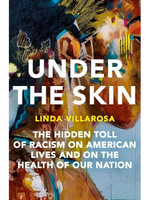 Under the Skin: The Hidden Toll of Racism on American Lives and on the Health of our Nation
Under the Skin: The Hidden Toll of Racism on American Lives and on the Health of our Nation
In 2018, Linda Villarosa's New York Times Magazine article on maternal and infant mortality among Black mothers and babies in America caused an awakening. Now, in Under the Skin, Villarosa lays bare the forces in America and its healthcare system that cause Black people to "live sicker and die quicker" compared to their white counterparts. Anchored by unforgettable human stories and offering incontrovertible proof, Under the Skin is dramatic, tragic and necessary reading.
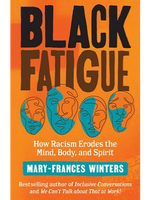 Black Fatigue: How Racism Erodes the Mind, Body, and Spirit
Black Fatigue: How Racism Erodes the Mind, Body, and Spirit
Black people, young and old, are fatigued, says award-winning diversity and inclusion leader Mary-Frances Winters. Winters describes how in every aspect of life—from economics to education, work, criminal justice and, very importantly, health outcomes—the trajectory for Black people is not improving. Black people are quite literally sick and tired of being sick and tired. Winters’ hope for this book is that it will provide a comprehensive summary of the consequences of Black fatigue and awaken activism in those who care about equity and justice.
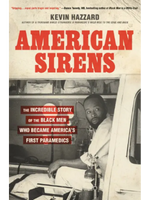 American Sirens: The Incredible Story of the Black Men Who Became America's First Paramedics
American Sirens: The Incredible Story of the Black Men Who Became America's First Paramedics
Until the 1970s, if you suffered a medical crisis, your chances of survival were minimal. A 9-1-1 call might bring police or even the local funeral home. But that all changed with Freedom House EMS in Pittsburgh, a group of Black men who became America’s first paramedics and set the gold standard for emergency medicine around the world, only to have their story and their legacy erased—until now. In American Sirens, acclaimed journalist and paramedic Kevin Hazzard tells the dramatic story of how a group of young, undereducated Black men forged a new frontier of healthcare.
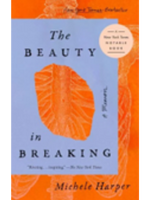 The Beauty in Breaking: A Memoir
The Beauty in Breaking: A Memoir
Michele Harper and her husband stayed together through medical school until, two months before she was scheduled to join the staff of a hospital in central Philadelphia, he told her he couldn't move with her. In the ensuing years, as Harper learned to become an effective ER physician, she came to understand that each of us is broken—physically, emotionally and psychically. The Beauty in Breaking is the poignant true story of Harper's journey toward self-healing. As she shines a light on the systemic disenfranchisement of the patients she treats as they struggle to maintain their health and dignity, Harper comes to understand the importance of allowing ourselves to make peace with the past as we draw support from the present.
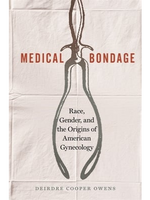 Medical Bondage: Race, Gender, and the Origins of American Gynecology
Medical Bondage: Race, Gender, and the Origins of American Gynecology
The accomplishments of pioneering doctors such as John Peter Mettauer, James Marion Sims and Nathan Bozeman are well documented. It is also no secret that these nineteenth-century gynecologists performed experimental caesarean sections, ovariotomies and obstetric fistula repairs primarily on poor and powerless women. In Medical Bondage, Deirdre Cooper Owens examines a wide range of scientific literature and less formal communications in which gynecologists created and disseminated medical fictions about their patients. Medical Bondage moves between southern plantations and northern urban centers to reveal how nineteenth-century American ideas about race, health and status influenced doctor-patient relationships. It also retells the story of Black enslaved women and Irish immigrant women from the perspective of these exploited groups and restores for us a picture of their lives.
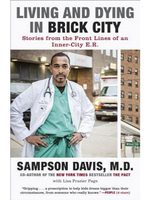 Living and Dying in Brick City: Stories from the Front Lines of an Inner-City E.R.
Living and Dying in Brick City: Stories from the Front Lines of an Inner-City E.R.
In this book, Dr. Sampson Davis looks at the healthcare crisis in the inner city from a rare perspective: as a doctor who works on the front line of emergency medical care in the community where he grew up, and as a member of that community who has faced the same challenges as the people he treats every day. Dr. Davis's sister, a drug addict, died of AIDS; his brother is now paralyzed and confined to a wheelchair because of a bar fight; and he himself did time in juvenile detention—a wake-up call that changed his life. With empathy and hard-earned wisdom, Living and Dying in Brick City is an important resource for anyone at risk, anyone close to those at risk and anyone who cares about the fate of our cities.
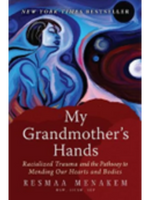 My Grandmother's Hands: Racialized Trauma and the Pathway to Mending Our Hearts and Bodies
My Grandmother's Hands: Racialized Trauma and the Pathway to Mending Our Hearts and Bodies
In this groundbreaking book, therapist Resmaa Menakem examines the damage caused by racism in America from the perspective of trauma and body-centered psychology. The body is where our instincts reside and where we fight, flee or freeze, and it endures the trauma inflicted by the ills that plague society. Menakem argues this destruction will continue until Americans learn to heal the generational anguish of white supremacy, which is deeply embedded in all our bodies. Our collective agony doesn't just affect African Americans. White Americans suffer their own secondary trauma as well. My Grandmother's Hands is a call to action for all of us to recognize that racism is not only about the head, but about the body, and introduces an alternative view of what we can do to grow beyond our entrenched racialized divide.
Historical Figures
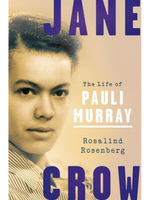 Jane Crow: The Life of Pauli Murray
Jane Crow: The Life of Pauli Murray
In this definitive biography, Rosalind Rosenberg offers a poignant portrait of Pauli Murray, who played pivotal roles in both the modern civil rights and women's movements. In the 1950s, her legal scholarship helped Thurgood Marshall challenge segregation head-on in the landmark Brown v. Board of Education case. When appointed by Eleanor Roosevelt to the President's Commission on the Status of Women in 1962, she advanced the idea of Jane Crow, arguing that the same reasons used to condemn race discrimination could be used to battle gender discrimination. In the early 1970s, Murray provided Ruth Bader Ginsburg with the argument Ginsburg used to persuade the Supreme Court that the Fourteenth Amendment protects not only Black people but also women—and potentially other minority groups—from discrimination. Murray accomplished all this while struggling with issues of identity. She believed from childhood she was male and tried unsuccessfully to persuade doctors to give her testosterone. She ultimately used her private feelings of being in-between to publicly contend that identities are not fixed, an idea that has powered campaigns for equal rights in the United States for the past half-century.
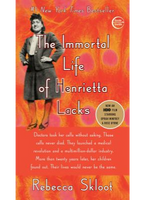 The Immortal Life of Henrietta Lacks
The Immortal Life of Henrietta Lacks
Her name was Henrietta Lacks, but scientists know her as HeLa. Her cells—taken without her knowledge—became one of the most important tools in medicine. Yet Henrietta's family did not learn of her "immortality" until more than twenty years after her death, when scientists began using her husband and children in research without informed consent. And though the cells had launched a multimillion-dollar industry that sells human biological materials, her family never saw any of the profits. As Rebecca Skloot so brilliantly shows, the story of the Lacks family—past and present—is inextricably connected to the dark history of experimentation on African Americans, the birth of bioethics and the legal battles over whether we control the stuff we are made of. Intimate in feeling, astonishing in scope and impossible to put down, The Immortal Life of Henrietta Lacks captures the beauty and drama of scientific discovery, as well as its human consequences.
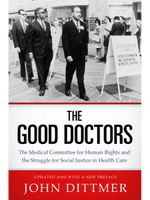 The Good Doctors: The Medical Committee for Human Rights and the Struggle for Social Justice in Health Care
The Good Doctors: The Medical Committee for Human Rights and the Struggle for Social Justice in Health Care
In the summer of 1964, medical professionals organized the Medical Committee for Human Rights (MCHR) to provide care and support for civil rights activists organizing Black voters in Mississippi. MCHR doctors soon realized fighting segregation would also mean exposing and correcting shocking inequalities in segregated healthcare. They pioneered community health plans and brought medical care to underserved or unserved areas. Award-winning historian John Dittmer, author of the classic civil rights history Local People: The Struggle for Civil Rights in Mississippi, has written an insightful and moving account of a group of idealists who put their careers in the service of the motto "Health Care Is a Human Right."
Understanding Racism
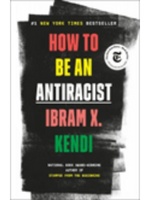 How to Be an Antiracist
How to Be an Antiracist
Antiracism is a transformative concept that reorients and reenergizes the conversation about racism—and, even more fundamentally, points us toward liberating new ways of thinking about ourselves and each other. In How to Be an Antiracist, Ibram X. Kendi takes readers through a widening circle of antiracist ideas—from the most basic concepts to visionary possibilities—that will help readers see all forms of racism clearly, understand their poisonous consequences and work to oppose them in our systems and in ourselves. Kendi weaves an electrifying combination of ethics, history, law and science with his own personal story of awakening to antiracism. This is an essential work for anyone who wants to go beyond the awareness of racism to the next step: contributing to the formation of a just and equitable society.
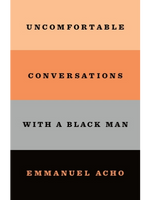 Uncomfortable Conversations with a Black Man
Uncomfortable Conversations with a Black Man
"You cannot fix a problem you do not know you have." So begins Emmanuel Acho in his essential guide to the truths Americans need to know to address systemic racism. "There is a fix," Acho says. "But in order to access it, we're going to have to have some uncomfortable conversations." In Uncomfortable Conversations with a Black Man, Acho takes on all the questions, large and small, insensitive and taboo, many white Americans are afraid to ask—yet which all Americans need the answers to, now more than ever. In his own words, he provides a space of compassion and understanding in a discussion that can lack both. He asks only for the reader's curiosity—but along the way, he will galvanize all of us to join the antiracist fight.
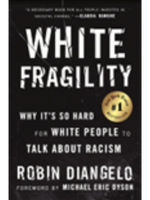 White Fragility: Why It's So Hard for White People to Talk About Racism
White Fragility: Why It's So Hard for White People to Talk About Racism
This New York Times best-selling book explores the counterproductive reactions white people have when their assumptions about race are challenged, and how these reactions maintain racial inequality. Antiracist educator Robin DiAngelo deftly illuminates the phenomenon of white fragility, the defensive moves that white people make when challenged racially. White fragility is characterized by emotions such as anger, fear and guilt, and by behaviors including argumentation and silence. These behaviors, in turn, function to reinstate white racial equilibrium and prevent any meaningful cross-racial dialogue. In this in-depth exploration, DiAngelo examines how white fragility develops, how it protects racial inequality and what we can do to engage more constructively.
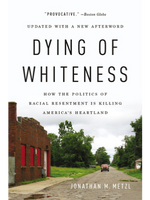 Dying of Whiteness: How the Politics of Racial Resentment Is Killing America's Heartland
Dying of Whiteness: How the Politics of Racial Resentment Is Killing America's Heartland
Interviewing a range of everyday Americans, Jonathan M. Metzl examines how racial resentment has fueled progun laws in Missouri, resistance to the Affordable Care Act in Tennessee and cuts to schools and social services in Kansas. He also shows these policies' costs: increasing deaths by gun suicide, falling life expectancies and rising dropout rates. Now updated with a new afterword, Dying of Whiteness demonstrates how much white America would benefit by emphasizing cooperation rather than chasing false promises of supremacy.
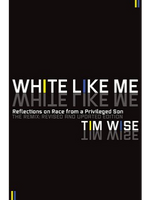 White Like Me: Reflections on Race from a Privileged Son
White Like Me: Reflections on Race from a Privileged Son
Using stories from his own life, Tim Wise examines what it really means to be white in a nation created to benefit people who are "white like him." This inherent racism is not only real, but disproportionately burdens people of color and makes progressive social change less likely to occur. Explaining in clear and convincing language why it is in everyone's best interest to fight racial inequality, Wise offers ways in which white people can challenge these unjust privileges, resist white supremacy and racism and ultimately help to ensure the country's personal and collective well-being.
Education
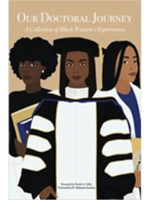 Our Doctoral Journey: A Collection of Black Women's Experiences
Our Doctoral Journey: A Collection of Black Women's Experiences
In the 2018-19 academic year, of the doctoral degrees awarded to women in the United States, only 10.9 percent were awarded to Black women compared to 63.6 percent to white women. For too long, Black women have faced many systemic barriers and various forms of racist exclusion and oppression in educational settings, which has often led to burnout, low sense of belonging and low retention rates. This memoir, Our Doctoral Journey: A Collection of Black Women's Experiences, serves as a resource and toolkit for Black women doctors, future doctors and professionals.
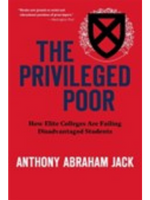 The Privileged Poor: How Elite Colleges Are Failing Disadvantaged Students
The Privileged Poor: How Elite Colleges Are Failing Disadvantaged Students
The Ivy League looks different than it used to. College presidents and deans of admission have opened their doors—and their coffers—to support a more diverse student body. But is it enough just to admit these students? In this bracing exposé, Anthony Jack shows that many students' struggles continue long after they've settled in their dorms. Admission, they quickly learn, is not the same as acceptance. This powerfully argued book documents how university policies and campus culture can exacerbate preexisting inequalities and reveals why some students are harder hit than others.
Leadership and Leaders
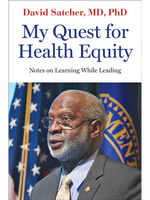 My Quest for Health Equity: Notes on Learning While Leading
My Quest for Health Equity: Notes on Learning While Leading
A former four-star admiral in the U.S. Public Health Service Commissioned Corps, Dr. David Satcher served as the assistant secretary for health, the surgeon general of the United States and the director of the Centers for Disease Control and Prevention before founding the eponymous Satcher Health Leadership Institute at Morehouse School of Medicine. In My Quest for Health Equity, Dr. Satcher takes an inspiring and instructive look inside his fifty-year career to shed light on the challenge and burden of leadership. In this book, readers will discover a template for using leadership roles of all types to eliminate health disparities.
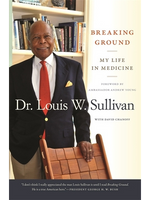 Breaking Ground: My Life in Medicine
Breaking Ground: My Life in Medicine
In Breaking Ground, Louis W. Sullivan, MD, recounts his extraordinary life, including his childhood in Jim Crow South Georgia and his trailblazing endeavors training to become a physician in an almost entirely white environment in the Northeast. He was the founding dean and president of Morehouse School of Medicine in Atlanta and served as secretary of the U.S. Department of Health and Human Services in President George H. W. Bush's administration. Sullivan passionately championed improved access to healthcare for all Americans and greater diversity among the nation's health professionals. Sullivan's life—from Morehouse to the White House and his ongoing work with medical students in South Africa—is the embodiment of the hopes and progress that the civil rights movement fought to achieve. His story should inspire future generations—of all backgrounds—to aspire to great things.
AACOM thanks Aisha Ali, MHRM, AACOM research analyst; Regina Bowman Goldring, MA, AACOM director of application services, recruitment and student affairs; Linda W. Goodson, RN, Alabama College of Osteopathic Medicine director of admissions, division of student services; LeAnn Hunter, MSOD, Pacific Northwest University of Health Sciences College of Osteopathic Medicine assistant provost; Tina C. Mason, MD, MPH, Marian University Tom and Julie Wood College of Osteopathic Medicine (MU-COM) associate professor of primary care; Andrea O'Brien, MS, A.T. Still University - Kirksville College of Osteopathic Medicine director of admissions and chair of AACOM’s Council of Osteopathic Medical Admissions Officers; Christopher Smith, EdD, Arkansas College of Osteopathic Medicine director of diversity, equity and inclusion; and Emily Young, MD, MU-COM assistant professor of pediatrics, for sharing these recommendations.
Anything we missed? Share what you’re reading this year by tagging us on Twitter at @AACOMmunities.
